Underwear
Avoid Undie Odor
Throughout the 1930s and 40s, the marketing team for Lux soap repeatedly warned consumers that if they didn't wash their clothes everyday, they risked having "undie odor". Some details from Suellen Hoy in her book Chasing Dirt: The American Pursuit of Cleanliness:Francis Countway, the president of Lever Brothers and the individual most responsible for the "discovery" of body odors and the "stop smelling" ad pitch, was inspired by Listerine's successful advertising campaign against the previously unknown halitosis. Countway and his associates admitted, while Lever Brothers' business boomed, that they cared little "about the opinions of softies who think that the Body and Undie Odor copy is disgusting." They were simply doing their job, "bringing cleanliness into a dirty world."
Lux soap was also responsible for the "undies are gossips" campaign.
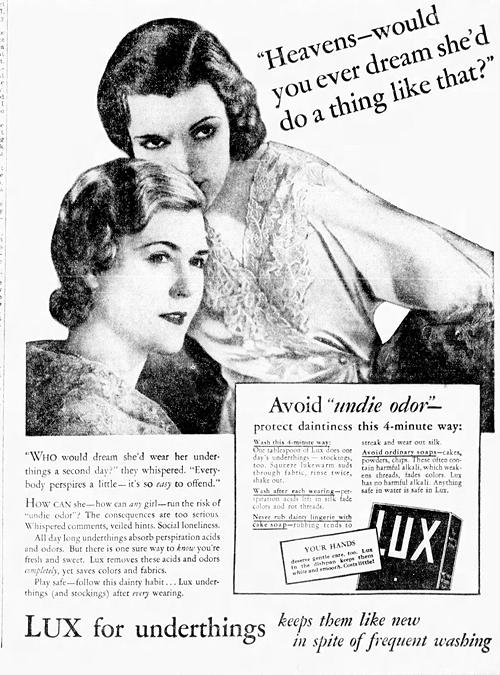
Wilmington Evening Journal - Feb 9, 1932
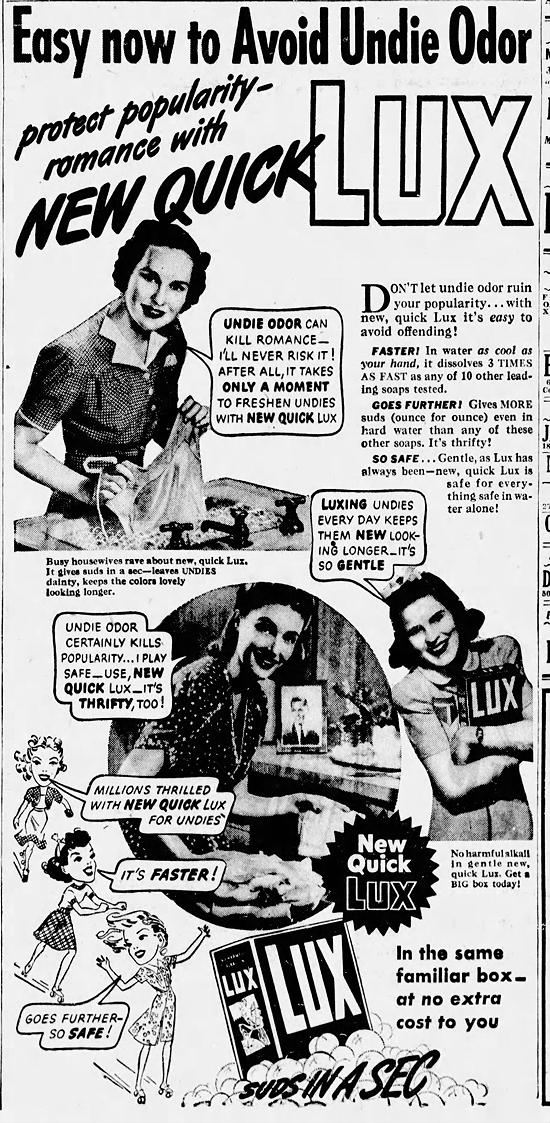
Kansas City Star - Apr 24, 1940
Posted By: Alex - Thu Apr 08, 2021 -
Comments (4)
Category: Hygiene, Advertising, Underwear, 1930s, Smells and Odors
Lingerie
Posted By: Paul - Sat Mar 27, 2021 -
Comments (2)
Category: Beauty, Ugliness and Other Aesthetic Issues, Body, Business, Movies, Underwear, 1920s
Clothes Form
Butler Baker invented a "clothes form" to prevent clothes from sticking to a person's body in hot weather. It consisted of a scaffolding of wire rings to be worn beneath a person's clothes.In his 1927 patent, Baker asserted that these rings would "maintain clothing spaced from the body of the wearer at all times, thereby overcoming the disagreeable feature of the clothing sticking to the body during warm weather." Furthermore, "the device is simple in construction, light, and constructed in a manner whereby it will not interfere with the bending of the body."
It would be even better if it somehow had a fan at the bottom blowing air over your body. You might look weird wearing it, but at least you'd be cool.
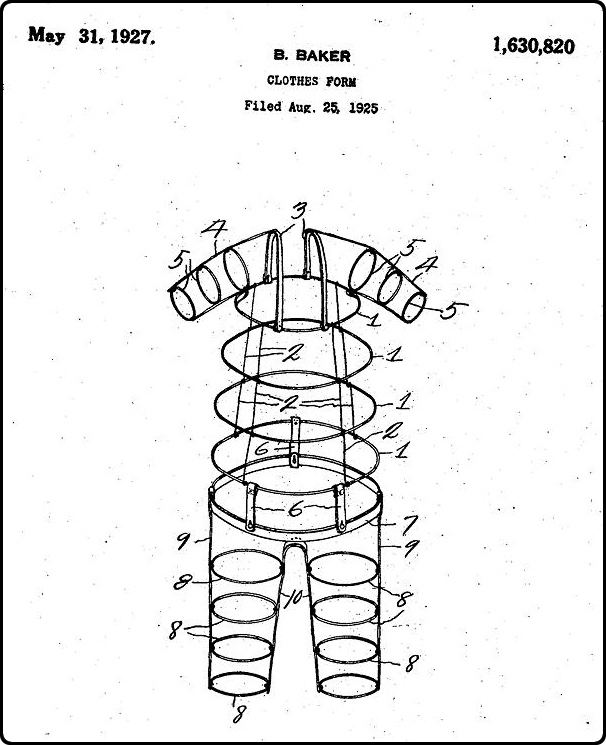
Posted By: Alex - Sun Mar 21, 2021 -
Comments (7)
Category: Fashion, Underwear, Patents, 1920s
Bic Disposable Pantyhose
1976: The Bic Pen Corp. decided to branch out into the women's underwear market by introducing a line of disposable pantyhose. The thinking was that their company was already known for making disposable pens and lighters. So why not disposable pantyhose as well? Plus, they figured that female secretaries would be keen to order pantyhose together with other office supplies.
This is now considered to be a classic marketing failure. Matt Haig writes in his book Brand Failures:
The main problem was that the company insisted on using the Bic name. As marketing writer Al Ries has observed, using the same name in unrelated categories can create difficulties. "If you have a powerful perception for one class of product, it becomes almost impossible to extend that perception to a different class," he argues.
The company apparently didn't learn much from this failed product, because in 1989 it introduced Bic Perfume, which is considered to be another classic business blunder.

Chicago Tribune - Apr 3, 1976
Posted By: Alex - Thu Mar 18, 2021 -
Comments (3)
Category: Business, Products, Underwear, 1970s
Follies of the Madmen #501
Our jockey shorts will have every male emulating a hula girl.Source.
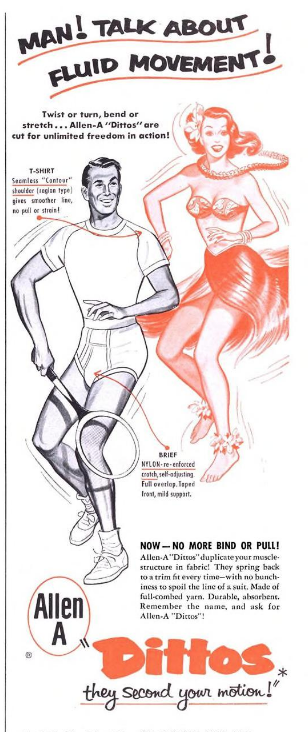 (Scroll down.)
(Scroll down.)
Posted By: Paul - Wed Mar 03, 2021 -
Comments (5)
Category: Business, Advertising, Underwear, 1950s, Gender-bending
How to make a turkey ornament out of used pantyhose
The Great Pantyhose Crafts Book (1982) explains how to make all kinds of things out of used pantyhose. For the Thanksgiving table, it offers instructions for a pantyhose turkey ornament.I imagine a pantyhose turkey would add a touch of class to any Thanksgiving gathering.
You can read the entire book for free via archive.org.


More in extended >>
Posted By: Alex - Thu Nov 26, 2020 -
Comments (1)
Category: Crafts, Underwear, Thanksgiving
Lightning-Struck Brassieres
Fatalities that occurred in 1982 and 1999 reveal that wearing an underwire bra in a lightning storm can lead to loss of life.
St. Joseph News-Press Gazette - Jun 19, 1982

The Vancouver Sun - Oct 28, 1999
Posted By: Alex - Wed Jul 01, 2020 -
Comments (1)
Category: Death, Underwear
Follies of the Madmen #479
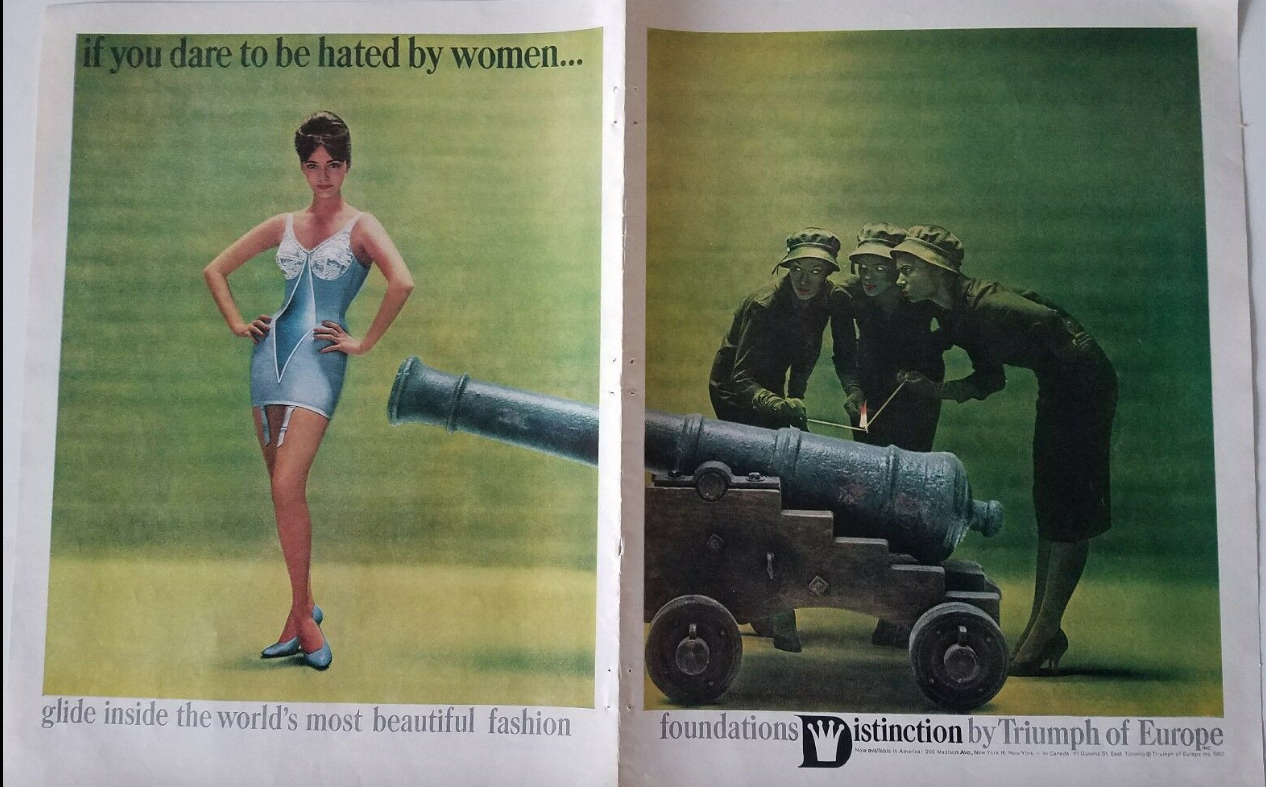
UPDATED: the source.
Posted By: Paul - Fri Jun 12, 2020 -
Comments (3)
Category: Business, Advertising, Emotions, Underwear, 1960s
Partisan Boxers
Just in time for the 2020 election, from the legendary Frederick's Of Hollywood.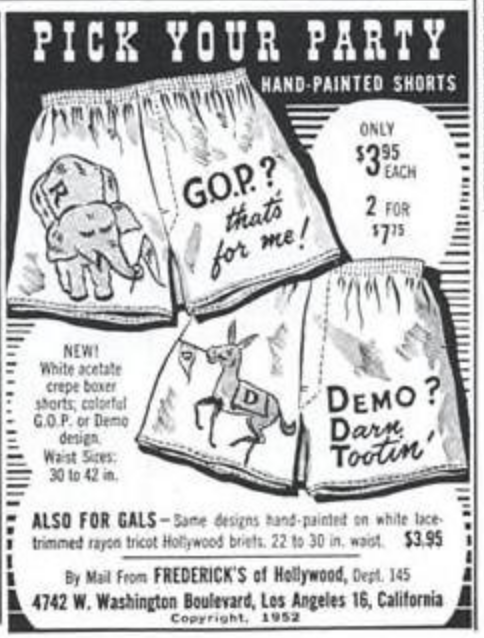
Ad source.
Posted By: Paul - Fri May 29, 2020 -
Comments (5)
Category: Animals, Politics, Underwear, 1950s
Medicated Under Vest
Not only a medical miracle but a fashion statement as well."has proven itself to be the very Perfection of Prevention from Pneumonia…. keeping the skin in a most delicious and healthy glow and the internal organs in that healthy and vigorous condition which is the Only Safeguard Against Disease."
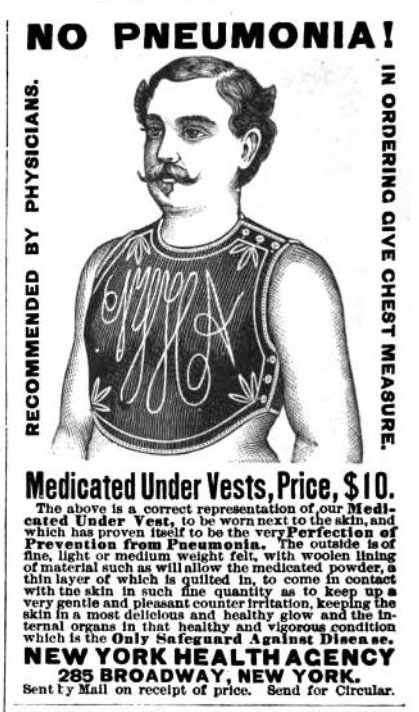
Posted By: Alex - Fri May 01, 2020 -
Comments (6)
Category: Fashion, Underwear, Health, Disease, Nineteenth Century

| Who We Are |
|---|
| Alex Boese Alex is the creator and curator of the Museum of Hoaxes. He's also the author of various weird, non-fiction, science-themed books such as Elephants on Acid and Psychedelic Apes. Paul Di Filippo Paul has been paid to put weird ideas into fictional form for over thirty years, in his career as a noted science fiction writer. He has recently begun blogging on many curious topics with three fellow writers at The Inferior 4+1. Contact Us |




